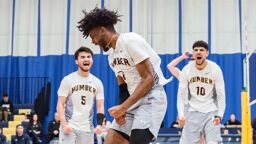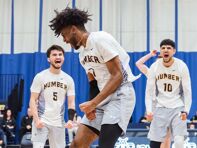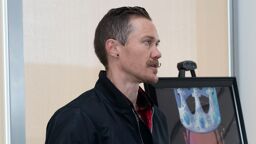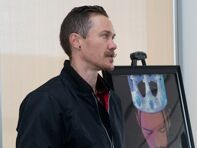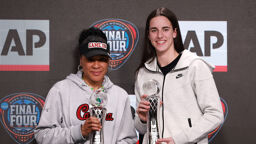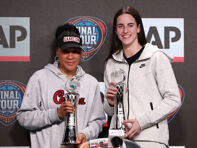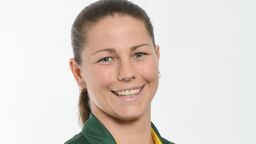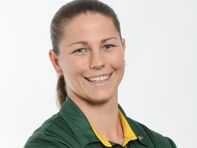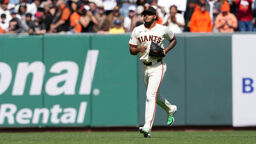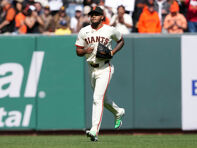A couple weeks ago, my old college soccer team competed in a Great Northeast Athletic Conference match. During play, a homophobic remark was made by a player from the other team directed at my friends and old teammates.
To contextualize the (excellent) response my former teammates made, I need to take you back two years or so.
I was a junior and captain of the Colby-Sawyer College soccer team in New Hampshire and had been out for over a year. We did not have a season that fall due to the response to the COVID pandemic, and that left more time for my teammates and me to be together without the pressure of competition.
I have received nothing but direct support from my teammates and coaches since I came out. They treated me like any other player and were wonderful to my boyfriend at the time when he would come up to visit.
On a more general level, though, they were still guilty of some very homophobic and hurtful remarks that weren’t directed specifically at me, but rather gay people in general. There seemed to be a consistent stream of jokes that ranged from something trivial like saying, “that’s so gay” when they meant to say “stupid,” to more horrific “jokes” made about potentially disowning their own future son if he were gay.
At the time, I was still trying to figure out what was hurtful to me as an out gay person. I had spent so long hiding all of myself I now could not figure out which parts of me I should defend, and when I should let go.
As the year wore on, the jokes became worse and my attempts to stop them failed. I spoke to my coach about holding a team meeting to discuss what I was experiencing. He told me that I had that power as a captain.
So that’s what I did.
I got all of my teammates into a room at the end of January 2021 and spoke to them for an hour. I called specific people out for specific I called them out for specific things that they had said, how it made me feel, and why it was harmful to other gay people.
At the end of the talk, I told them that I was not sure if this would work. There was no way to know right now. The only way I would know if it had worked was when a situation came up where something homophobic was said, I would not have to say anything because my teammates would have stepped up for and with me.
That fall, that’s exactly what they did. I was called a “faggot” during another GNAC game by an opposing player who knew I was gay. It hurt me deeply, and I was in no good head space to continue playing. But of course I went back out because I wasn’t going to let him win.
My mind was all over the place, my existence felt unwelcome, and I could not concentrate. Fortunately, my teammates could. This was their moment to show me what they had learned from my talk eight months previously.
We won the game.
My friends had made incredible progress, and I was so proud of them for responding in the way that they did.
After the season ended and graduation approached, a different concern came to my mind. I believe that having me on that team, someone who is so unafraid and unapologetic of who they are makes it “easier” to catch homophobia from yourself or others because you have this physical reminder right in front of you. My concern was how my absence would affect my teammates. Would they, subconsciously, let more slide because I was no longer there to show them how much these things truly hurt?
As it turns out, I needn’t have worried.
In the game this fall, my teammates instantly called out the player using the homophobic language gay slur for what he said, making it clear that it was not right and they wouldn’t tolerate it.

When I asked the team captain about it, Callum Buchanan (who also happens to be my best friend), described the moment and how he handled it.
“I was confused for a second thinking, did he really just say that? I then said to the group of them, ‘I’m all for taking the piss out of each other, but there’s no need to be homophobic boys.’ I said this a couple times before a few of their players apologized to me and said that whoever said it shouldn’t have said it.”
That is the moment that anyone who has ever worked on anything for a long time goes, “that’s it. This worked.”
That was my moment, but more importantly that was my team’s moment. This was their moment to say to everyone listening and watching that regardless of who is on our team, we will not stand for homophobia in any form, whether it is directed at a straight player or a gay player.
As a program, they have made it clear to the conference that if any more homophobic or other derogatory remarks are made during any of their games, they will walk off the field. And to sit here writing this as an alumnus of a program that I worked so hard to change, the feeling of joy for queer kids who will play on that team in the future and feel safe and protected and valued cannot be put into words.
I want that reality to be my legacy and thanks to my friends, people who really listened to my experience as a gay footballer, it is.
You can find Couper Gunn on Instagram. Among other projects, he is involved with the Sports Equality Foundation.
If you’re an LGBTQ person in sports looking to connect with others in the community, head over to GO! Space to meet and interact with other LGBTQ athletes, or to Equality Coaching Alliance to find other coaches, administrators and other non-athletes in sports.









